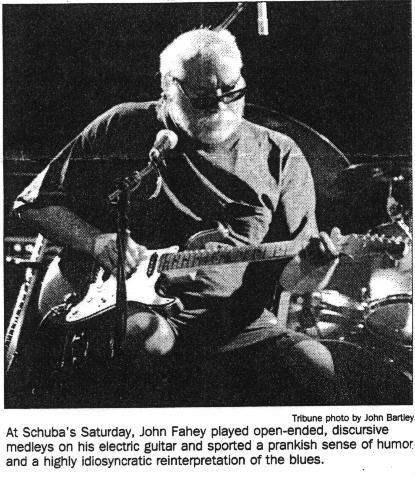
Tempo 2
Section 5 Chicago Tribune, Monday, May 3, 1999
______________________________________________________________________________________________________________________________________

Quirky blues played with humor by John Fahey
Forty years ago, a philosophy student named John Fahey
spent $300 he saved from his job as a nighttime gas station attendant to
record and press 100 copies of an album called "Blind Joe Death." It was
both a hoax and a revelation; Fahey represented it as a collaboration between
himself and the nonexistent bluesman after which it was named in order
to pull the leg of folk music enthusiasts. But it also announced to the
world the advent of a skilled musician who was also a bold conceptualist.
Over the next quarter century, Fahey went on to establish the solo
steel string acoustic guitar as a viable concert instrument. He made a
varied and often brilliant series of records that wedded the instrumental
techniques of country blues and bluegrass to classically inspired compositions.
He also experimented with sound collages and sambas, and issued a series
of popular Christmas records.
| During the late '80s, Fahey ceased performing after he fell victim
to ill health and bad personal fortune. Since his return in 1996, he has
aligned himself with alternative music, collaborating with the Boston-based
rock band Cul De Sac and local polymath Jim O'Rourke. His recent concert
appearances have confirmed his determination not to rest on his laurels.
At the Empty Bottle in 1996 he played rambling explorations of the edgy,
challenging material from his album "City of Refuge." Last year's appearance
atthe Unity Temple in Oak Park was more conciliatory; he presented material
from throughout his career, but abandoned his acoustic guitar for' an electric
instrument.
On Saturday, the first evening of a two-night stand at Schuba's Tavern, Fahey once more played electric guitar. The white-bearded guitarist picked out open-ended, discursive medleys that didn't sound much like "Blind Joe Death" but, like that record, sported a prankish sense of humor and a highly idiosyncratic reinterpretation of the blues. |
He began by telling the audience about
the merits of belly dancing music while detuning his bass strings until
they twanged like loose rubber bands. He plunked out sagging, wobbly low
chords, then began alternating them with well-articulated single note passages
in a higher register. Retuning as he played, he brought the two together
and launched into a sequence of ghostly country blues melodies.
Fahey performed the entire concert bathed in murky red and green light His playing was similarly drenched in artificial reverberation, which proved to be a double-edged sword. It accentuated the black-hearted discontent of "City of Refuge" with subtle, swelling dissonances, but submerged some fine picking in a wash of echoes. Fahey closed the concert with "Gaucho" and "Guitar Lamento," two brooding pieces by the late Brazilian composer Bola Sete that featured some of the night's most expressive playing. |